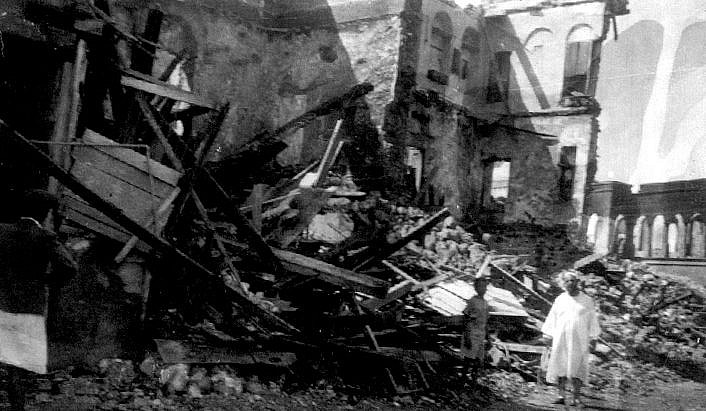The story of the dispossession of Joseph Smouha, who built Smouha City in Alexandria out of marshland, is a remarkable one. What is perhaps more remarkable, is that this article by Joseph Braude appeared in the Arab magazine Majalla (with thanks: Richard).
Ask a young Egyptian what “Smouha” means and he
will likely tell you it is an excellent football team in
Alexandria, lately ranking third in Egypt’s premier league. He
may also know that the team takes its name from Smouha City, a
resplendent Alexandrian suburb.
Sisters' St, Alexandria, 1941.
So it wasn’t surprising that when Richard
Smouha, a Swiss national, recently submitted his passport to a
man of Egyptian origin at an airport in Amsterdam, the officer
asked him, “Did you know that your family was named after a
place in Egypt?”
But Smouha’s reply surprised the officer:
“Actually, the place in Egypt was named after my family.”
It may further surprise many Egyptians to know
that the builder of Smouha City, Richard’s grandfather Joseph,
was an Iraqi Jew, born in Baghdad in 1878. At age 14, he moved
with his family to the British city of Manchester, where he
gained his education and began a prosperous career as a cotton
broker. At age 36, with the outbreak of World War I, he closed
his business and offered himself for public service.
What would lure him away from his government
work and back into the private sector was a dream — a vision —
which came to him neither in his native Iraq nor in his
adopted country of Great Britain but in Egypt. In 1923, while
visiting the country on behalf of the British government, he
was riding the train from Cairo to Alexandria, along the edge
of then-mosquito-infested marshlands adjoining the lakes of
the Nile Delta. He observed that the swamps were effectively
blocking the expansion of Alexandria — an untenable situation
in light of the city’s burgeoning economy and natural
demographic growth.
He explored the matter with Alexandrian friends
and officials, who welcomed his interest in the problem of the
marshlands. They offered him ownership of 700 acres of
hazardous territory for free if he would commit to draining
the swamps at his own expense. Smouha insisted on paying a
commercial price for the area. He proceeded to move his wife
and eight children to the ancient city and embark on the
project of his lifetime.
At the time, seven percent of the inhabitants of
Alexandria — approximately 24,000 people — were Jews. (The
Jewish population in all of Egypt totaled 80,000.) The
Alexandrian Jewish community was prominent in nearly every
field of human activity: Jews ranked among the more
sought-after doctors and lawyers, contributed prolifically to
the public discussion, and served as teachers to tens of
thousands of Egyptian students. Among prominent bankers and
financiers, for example, the Menashe family — which also came
from Iraq, in 1795 — invested in the human development of
Alexandria by establishing schools for poor children.
But Joseph Smouha never imagined his
construction project as an enclave for any particular
ethnicity or sect. To the contrary, he envisioned an organic
extension of cosmopolitan Alexandria that would embody the
city’s finest traditions of diversity and coexistence. Smouha
invited architects in Egypt and across the European continent
to compete for the privilege of helping to design the new
area. The plan called for all the features of a town:
residential housing, schools, hospitals, an industrial zone, a
police station, a post office — as well as a church, a
synagogue, and a mosque. It was in essence an Alexandrian
appropriation of the concept of a “garden city,” which had
begun to appear in Great Britain, whereby an entire urban
ecosystem was constructed simultaneously on a discrete piece
of land. Smouha proposed to name the project Fouad City, after
the country’s then-reigning king. But the monarch insisted it
be known as Smouha City instead. It became an upscale
residential suburb. The many indigenous elites who took up
residence there were joined by former European royalty,
including the exiled King of Italy, Victor Emanuel, who lived
and died there. Over time, Smouha City also came to include a
race course, golf course, and sports club.
Within a few years, a new town had appeared out
of nowhere and taken root as a seamless extension of the city
to which it was affixed. The man who founded it, however,
suffered an altogether different fate: On November 23, 1956,
following the Suez War, President Gamal Abdel Nasser issued a
proclamation declaring all Jews to be enemies of the state.
Jews had already been leaving in significant numbers prior to
the declaration: Amid a wave of anti-Jewish fervor following
the establishment of the State of Israel and the first
Arab-Israeli war, bombings of Jewish areas killed 70 Jews and
wounded nearly 200, while riots claimed many more lives. The
1956 proclamation caused 25,000 more Jews to flee for Israel,
Europe, the United States, and South America. Their assets
were confiscated by the government. Smouha City, too, was
sequestrated, nationalized, and confiscated, in a wave of such
actions taken against British and French property as well.
Joseph Smouha saw his beloved Alexandria for the last time in
1957 — which was also the year Abdel Nasser evicted Armenians,
Greeks, and a subset of Egyptian Coptic elites from
Alexandria.
By the time Smouha died in Paris in 1961, at the
age of 83, his memories and melancholy had intermingled in the
blur of old age. His family recalls that in his final years he
sometimes called out to his wife, “I must get back to the
office. What’s happening? Why aren’t we going to the office?”
She would reply, “Joe, don’t you remember we can’t go back.
They’ve taken it all away.” “Oh yes,” he said, and began to
cry again. Upon his death, an obituary in the British Daily
Telegraph noted that King Fouad had remembered him as a
“foreigner who brought his own money to Egypt and did good for
the country.”
Shortly before his death, the Smouha family
filed a claim for compensation for the value of the
expropriated property with the British Foreign Claims
Commission. The government body had been established to make
payments to British nationals from the 27.5 million pounds
sterling ($77 million) which Egypt
paid Great Britain in settlement of all claims for property in
Egypt. The Smouhas believed that the value of the properties —
excluding the schools, hospitals, houses of worship, and other
facilities which Joseph had donated— was 12.5 million pounds
sterling ($35 million), or the
equivalent of 260 million pounds ($371
million) today. But the family received only a small fraction
of that sum, because the settlement was calculated on the
basis of the territory’s value as farmland rather than
developed urban property.
* * *
In some ways, the story of Joseph Smouha is a
microcosm of the story of close to one million Jews indigenous
to the Middle East and North Africa who almost completely
vanished from the landscape, largely over 25 years, from 1948
to 1973 — the historical blink of an eye. In Iraq, Yemen,
Syria, and elsewhere, their history dated back millennia,
almost to the dawn of monotheistic history. In other parts of
the region, their history dated back centuries — in North
Africa, for example, to the period of the expulsion of Jews as
well as Muslims from what had once been called Al-Andalus; or
as a result of comparatively recent historical migrations.
Their expulsion over the mid-twentieth century stemmed from a
complex combination of historical factors. The most obvious,
however, was the policy of numerous Arab military republics —
supported by substantial elements within the society — to
collectively punish all Jews for the establishment of the
State of Israel, regardless of whether they happened to
support the new country or not. The Arab world effectively
disgorged a piece of its soul: one of its oldest communities,
a professional class, a force for civil society and progress.
Much of what the Arab world lost, Israel gained: hundreds of
thousands of talented and resourceful people who, together
with their offspring, now make up the majority of the
country’s Jewish population.
This pivotal million, in crossing over from one
world to another, underwent the trauma of refugees everywhere:
they left behind the only way of life they had known in hopes
that something better lay ahead. Some lost their lives en
route. Nearly all were dispossessed of their property and
assets, arriving penniless at their destination. According to
a 2007 study by the World Organization of Jews from Arab
Countries, total real estate lost to the region’s Jewish
property owners exceeded 62,000 square miles — a land mass
nearly eight times the size of the State of Israel. Financial
losses have been conservatively estimated at the present-day
equivalent of $80 billion. A
hard-working and resilient community, they sought to integrate
into their adopted countries and establish a decent standard
of living again from scratch. Part of what makes their exodus
bitter is not the losses they incurred by fleeing, but rather
the loss Arab societies brought upon themselves by discarding
them.
In the present period of metastasizing human
suffering in the Middle East, amid new waves of ethnic and
sectarian cleansing and the massive displacement of peoples
and their loved ones, this sad chapter in the region’s history
bears remembering. Doing so is an important part of the
introspection our societies need in order to begin the process
of reconciliation and redress for peoples of every indigenous
religion and faith. Moreover, the remnants of the Arab world’s
indigenous Jewish communities, scattered as they are across
the globe, are themselves a potential asset as Arab countries
begin to turn their eyes toward reconstruction: Despite the
bitterness of the latter years of Jewish communal life in the
Arab world, many of the refugees and their descendants cherish
the happier memories long past, and long for the friends they
lost when they were forced to flee. These positive human
sentiments, if effectively tapped by extending a hand of
friendship, could potentially provide a foundation on which to
build — enabling new partnerships to accelerate the pace of
renewal across the region.





















